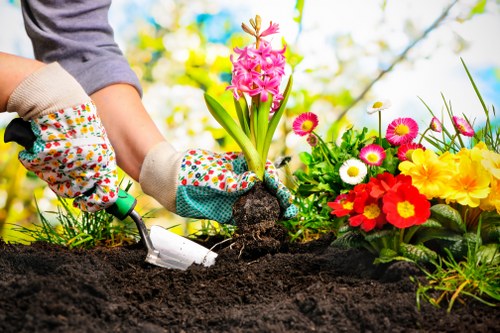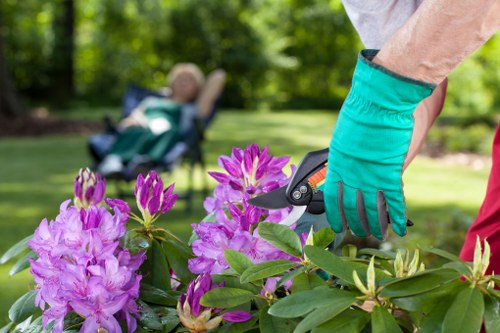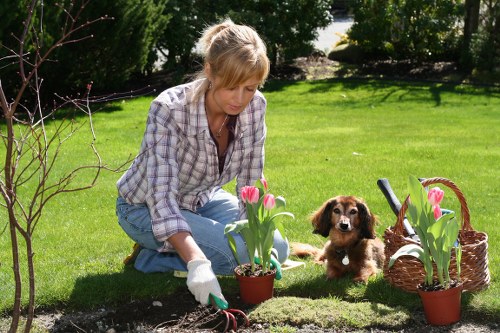Effective Driveway Algae Removal in Woodside Park

Maintaining a clean and safe driveway is essential for any homeowner in Woodside Park. However, one common issue that residents face is the growth of algae on their driveways. Algae not only make your driveway look unsightly but can also create slippery surfaces, posing safety hazards. In this article, we will explore effective methods for driveway algae removal in Woodside Park, ensuring your driveway remains clean and safe throughout the year.
Algae thrive in damp, shaded environments, making driveways with limited sunlight the perfect breeding ground. The moist conditions, combined with organic debris, create an ideal habitat for algae to flourish. Addressing this problem promptly can prevent further growth and maintain the aesthetic appeal of your property.
Understanding the causes of algae growth is the first step toward effective removal. Factors such as climate, proper drainage, and driveway material all play a role in how quickly algae can spread. By identifying these factors, you can implement preventative measures to reduce the likelihood of future algae infestations.
Common Causes of Algae Growth on Driveways

Algae growth on driveways is influenced by several factors. The primary contributors include:
- Moisture: Consistent moisture from rain or poor drainage keeps the driveway damp, promoting algae growth.
- Shade: Areas with limited sunlight create cooler, damp conditions favorable for algae.
- Organic Matter: Leaves, dirt, and other organic debris provide nutrients that algae need to thrive.
- Driveway Material: Some materials, like concrete and pavers, retain moisture longer, increasing the chances of algae formation.
By addressing these factors, homeowners can significantly reduce the occurrence of algae on their driveways.
Effective Algae Removal Techniques

Removing algae from your driveway involves a combination of cleaning methods and preventive measures. Here are some effective techniques:
- Pressure Washing: Using a pressure washer can effectively remove algae and other organic matter from the surface of your driveway.
- Chemical Treatments: Algaecides and bleach solutions can kill algae spores and prevent regrowth.
- Natural Remedies: Vinegar and baking soda solutions offer eco-friendly alternatives for algae removal.
- Regular Maintenance: Keeping the driveway clean and free from debris reduces the chances of algae growth.
- Improving Drainage: Ensuring proper drainage prevents water accumulation, deterring algae proliferation.
Implementing a combination of these methods can yield the best results in algae removal and prevention.
Pressure Washing: A Comprehensive Approach
Pressure washing is one of the most effective ways to remove algae from your driveway. The high-pressure water stream can eliminate stubborn algae and restore the driveway's appearance. It’s important to use the correct pressure settings to avoid damaging the driveway surface. For best results, consider hiring professional pressure washing services in Woodside Park.
Chemical Treatments: Safeguarding Your Driveway
Chemical treatments, such as algaecides or diluted bleach solutions, can effectively kill algae spores. These treatments should be applied carefully, following manufacturer instructions to prevent harm to surrounding vegetation and ensure safety. Regular application of chemical treatments can help maintain a algae-free driveway.

Natural remedies like vinegar and baking soda are excellent alternatives for those seeking environmentally friendly solutions. These substances can break down algae without the use of harsh chemicals, making them safe for pets and plants. Mixing vinegar with water or creating a baking soda paste can effectively eradicate algae and prevent its return.
Regular maintenance is crucial in keeping algae at bay. Sweeping away leaves, debris, and other organic matter reduces the nutrients available for algae growth. Additionally, addressing leaks or areas with poor drainage can help maintain a dry driveway, further discouraging algae formation.
Improving drainage around your driveway is another essential step. Ensuring that water flows away from the driveway through proper grading or installing drainage systems can prevent water accumulation, a key factor in algae growth. Proper drainage not only deters algae but also protects your driveway from water damage.
Preventative Measures for Long-Term Algae Control

Preventing algae growth requires a proactive approach. Here are some strategies to maintain a clean driveway:
- Seal your driveway to create a less porous surface that resists moisture and algae accumulation.
- Trim surrounding vegetation to allow more sunlight to reach the driveway, reducing shade and moisture.
- Regularly clean your driveway to remove debris and potential algae nutrients.
- Ensure proper drainage by checking for and clearing any blockages in gutters and drains.
- Consider installing shade structures or awnings if natural sunlight is limited.
By integrating these preventative measures into your regular maintenance routine, you can significantly reduce the chances of algae returning to your driveway.
Local Services for Driveway Algae Removal in Woodside Park
Woodside Park offers a range of professional services specialized in driveway algae removal. These experts have the knowledge and tools to effectively clean and maintain your driveway, ensuring long-lasting results. Hiring local professionals also supports the community and ensures that the services are tailored to the specific climate and conditions of Woodside Park.
Impact of Algae on Driveway Safety and Aesthetics
Algae not only detracts from the visual appeal of your driveway but also poses safety risks. The slippery surface caused by algae can lead to accidents, especially during wet conditions. Moreover, extensive algae growth can degrade driveway materials over time, leading to costly repairs or replacements.
Maintaining Curb Appeal
A clean driveway enhances the overall appearance of your property, contributing to its curb appeal and potentially increasing its market value. Regular algae removal showcases your commitment to property maintenance and can make a positive impression on visitors and potential buyers.
Ensuring Safety
Preventing algae growth through regular cleaning and maintenance ensures that your driveway remains safe for pedestrians and vehicles alike. Addressing algae promptly minimizes the risk of slips and falls, protecting your family and guests from potential injuries.
Environmental Considerations in Algae Removal
When removing algae from your driveway, it's essential to consider the environmental impact of the methods and products used. Opting for eco-friendly solutions, such as vinegar and baking soda, can effectively eliminate algae without harming the surrounding ecosystem.
- Non-toxic solutions prevent contamination of soil and water sources.
- Eco-friendly products reduce the risk of harming plants and beneficial microorganisms.
- Proper disposal of algae removal waste minimizes environmental footprint.
By choosing environmentally responsible methods, you contribute to the preservation of Woodside Park’s natural beauty and promote sustainable living practices.
Choosing the Right Algae Removal Method
Selecting the appropriate algae removal method depends on various factors, including the extent of algae growth, driveway material, and personal preferences regarding chemical usage. Combining multiple methods can provide more comprehensive results, ensuring thorough algae elimination and long-term prevention.
Conclusion
Driveway algae removal in Woodside Park is essential for maintaining both the safety and beauty of your property. By understanding the causes of algae growth and implementing effective removal and prevention strategies, you can ensure a clean, safe, and aesthetically pleasing driveway year-round. Whether you choose professional services or DIY methods, consistent maintenance is key to keeping algae at bay.
Frequently Asked Questions
- What is the best method for removing algae from a driveway?
Pressure washing combined with appropriate chemical treatments is highly effective. For eco-friendly options, vinegar and baking soda solutions can also work well.
- How often should I treat my driveway for algae?
Regular treatment every 6 months is recommended to prevent algae buildup, especially in areas with high moisture and shade.
- Can algae damage my driveway?
Yes, excessive algae growth can make the driveway slippery and may contribute to material degradation over time.
- Are there eco-friendly algae removal solutions?
Yes, natural remedies like vinegar, baking soda, and eco-friendly algaecides are available and effective.
- Should I hire a professional for algae removal?
Hiring a professional ensures thorough cleaning and effective treatment, especially for severe algae infestations.


